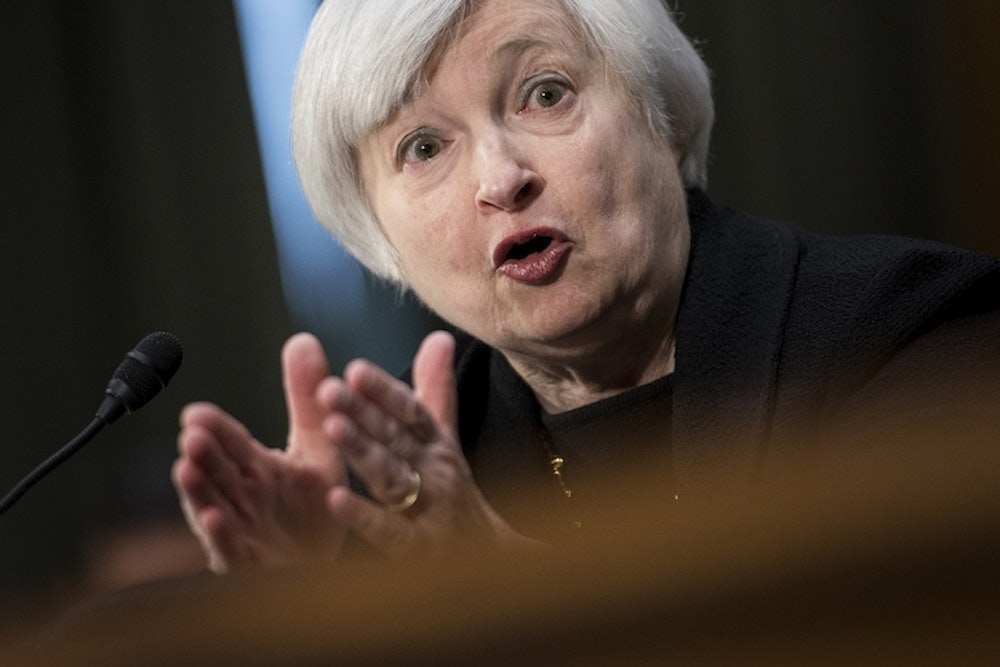On Friday, the Federal Reserve delayed by two years compliance with the Volcker rule, the prohibition on banks’ proprietary trading—deals made to profit the bank instead of their clients. The postponement removes a key argument of those people who dismissed Congress’ Christmas gift last week to Wall Street, the elimination of Dodd-Frank Section 716.
Section 716 required commercial banks to push their riskiest swaps into separately capitalized subsidiaries—but Congress nixed it with a rider in its year-end budget bill known as the CRomnibus. Wall Street lobbied intensively for Section 716’s erasure, but even some of the finance industry’s toughest critics, like Paul Krugman, argued that substantively, it wasn’t that big a deal.
And one key reason they gave for this was that the Volcker rule overlapped with the Section 716 rule. The theory went that the Volcker rule already prohibited risky trades, so there was no need to also spin them off into subsidiaries. The Bipartisan Policy Center (BPC), applauding the CRomnibus maneuver, wrote, “a well-structured and monitored Volcker rule will accomplish the same policy objectives as the Lincoln amendment, making the swaps push out both costly and unnecessary.” (BPC calls Section 716 “the Lincoln amendment” because the provision was initially added to Dodd-Frank by then-Senator Blanche Lincoln.)
Let’s first point out that this isn’t true. Mike Konczal, Alexis Goldstein, and Caitlin Kline explained this, noting the difference between risky activities and risky products. The Volcker rule does stop certain risky activities. But if banks sell products like uncleared credit default swaps, under the guise of “making markets” or hedging other bets, then they are exempted from the Volcker rule.
Volcker and 716 were complementary regulations. What the Volcker rule doesn’t prohibit Section 716 forces out into a separate subsidiary. If key elements of the Volcker rule won’t be enforced until 2017—as the Federal Reserve just announced—then the logic of killing other rules that allegedly “overlap” with it completely falls apart. Banks already have had four years since the passage of Dodd-Frank to comply with the Volcker rule; with the multiple Federal Reserve extensions, they now have nearly seven years to unwind investments in entities like private equity firms and hedge funds. The Fed also confirmed a previous announcement that banks need not exit their investments in collateralized loan obligations until 2017.
This gives financial institutions nearly three more years of exposure to investments that could easily go sour. So you would definitely want a mechanism to at least push some bank trades away from the FDIC safety net, to protect taxpayers and encourage stability (if you have bailout protection for your trades, you’ll probably want to do more of them). But that ended when President Obama signed the CRomnibus and purged Section 716.
To accomplish the latest two-year delay, the Fed had to break the spirit of the rules. The Fed is empowered under Dodd-Frank to delay regulations like the Volcker rule for only one year at a time. So in its announcement, the Fed both acted on a one-year delay to 2016, and also “announced its intention to act next year” on “an additional one-year extension.” It did not require banks to apply for the extension based on objective information about particular hard-to-unwind investments.
“It is a troubling sign that the Fed granted a two-year blanket extension without requiring a public application, justification and determination establishing the basis for the failure to comply with the law,” said Dennis Kelleher of the financial reform group Better Markets in a statement.
You have to believe that it’s less a case of not being able to exit investments, and more a case of simply not wanting to. Banks lobbied the Federal Reserve for the extension because of the possibility of taking losses if they had to get out of the investments by next July, as scheduled. This “right to profit” doesn’t actually exist in any formal sense, but it often gets trotted out as a justification for a light regulatory touch on the banks.
Unfortunately, while Fed Chair Janet Yellen pays lip service to tighter restrictions on the financial system, key officials at the Fed, like general counsel and Greenspan-era holdover Scott Alvarez, have openly stated their willingness to water down regulations like the Volcker rule. “This is clearly the doing of Federal Reserve general counsel Scott Alvarez,” said one Democratic aide to the Huffington Post. If Yellen and the point person among the Board of Governors on financial reform, Daniel Tarullo, really want to practice what they preach, they need to dump Alvarez.
But regardless of the Fed infighting, this continued delay shows exactly why you don’t want Congress to start eliminating Dodd-Frank rules willy-nilly. The law contains an interlocking set of provisions, which work in tandem. Killing pieces of Dodd-Frank just allows Wall Street lobbyist to focus on the implementation of what’s left, and secure changes favorable to their interests.
It’s also notable that the delay extends beyond the 2016 elections. That gives financial institutions the entire Congressional session, with Republicans in charge, to chip away at the Volcker rule before its full implementation. Clearly that’s banks’ goal, using must-pass vehicles to make the alterations. “We have created a model,” said Kevin Yoder, the Republican Congressman who slipped the swaps provision into the CRomnibus. “This bipartisan success shows a pathway to solving other issues in the financial services area.”
There’s a growing idea that the banking industry’s success in repealing Section 716 of Dodd-Frank represented a Pyrrhic victory, that it has now put such a target on banks’ backs that it won’t be able to get anything else done. But maybe it was just a victory, which will lead to more victories, like the one this week at the Fed. Wall Street knows how to fight on all fronts, working the implementation lever when the Congressional lever is blocked, and vice-versa. The result is a financial sector that looks quite a bit like it did before the financial crisis.
